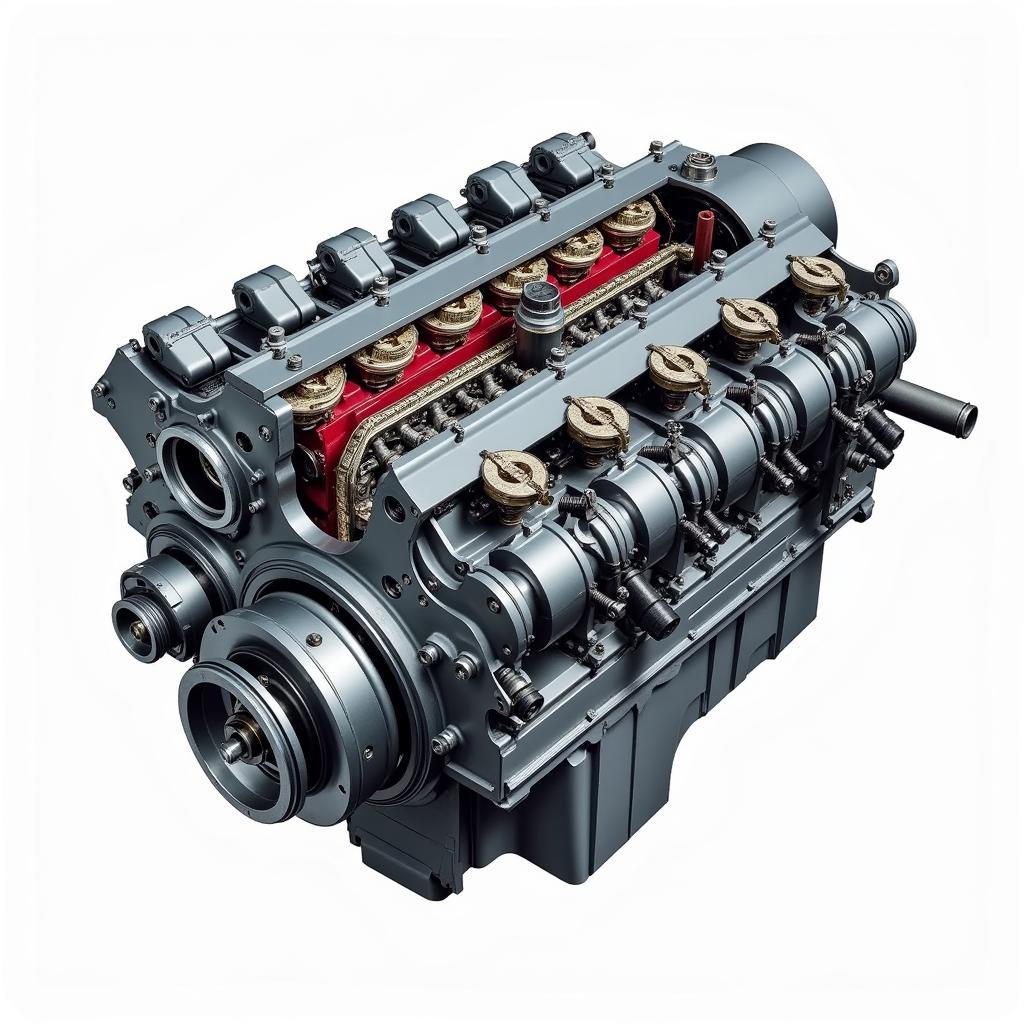The distinct bmw v10 f1 sound is legendary among car enthusiasts. It’s a symphony of mechanical precision, a testament to BMW’s engineering prowess, and a sound that evokes the raw power and excitement of Formula 1 racing. But what makes this engine’s sound so unique and captivating? This article delves deep into the origins, mechanics, and enduring appeal of this iconic engine note.
 BMW V10 F1 Engine Overview
BMW V10 F1 Engine Overview
The S85 engine, the heart of the E60 BMW M5 and E63/E64 BMW M6, is a naturally aspirated V10 masterpiece that produced an unforgettable acoustic experience. Its high-revving nature, combined with a unique firing order, created a sound unlike any other. Unlike the more common V8 configurations, the V10’s uneven firing intervals contribute to a complex and layered sound. It’s a blend of deep bassy rumbles, high-pitched screams, and a characteristic metallic rasp that resonates with anyone who appreciates automotive artistry. You can compare this to the bmw m5 v10 f1 sound.
Decoding the BMW V10 F1 Sound
The magic of the bmw v10 f1 sound lies in its intricate design and engineering. The engine’s 90-degree cylinder bank angle, combined with ten individual throttle bodies, allows for precise control over airflow. This intricate design facilitates an almost instantaneous throttle response and contributes significantly to the engine’s signature howl. The engine’s high redline of 8,250 rpm further amplifies this effect, creating a crescendo of mechanical noise that’s both exhilarating and addictive. It’s a sound reminiscent of the bmw f1 v10 engine sound that dominated Formula 1 in the mid-2000s.
Why is the BMW V10 so loud?
The V10’s loudness is a direct result of its high-performance design. The free-flowing exhaust system, designed to minimize backpressure, amplifies the engine’s natural sounds. The lack of turbochargers or superchargers, common in modern performance engines, further contributes to the purity and intensity of the sound. This natural aspiration allows the engine to breathe freely, producing a raw, unfiltered sound that’s becoming increasingly rare in today’s automotive landscape.
The Legacy of the BMW V10 F1 Sound
The BMW V10 engine is a testament to a bygone era of naturally aspirated performance. While modern turbocharged engines may offer superior power and efficiency, they often lack the visceral connection and acoustic drama of their naturally aspirated predecessors. The bmw v10 f1 sound stands as a symbol of a time when automotive engineering prioritized pure driving experience.
What car has the BMW V10 engine?
The E60 BMW M5 and the E63/E64 BMW M6 are the iconic vehicles that housed this legendary engine. These cars are now highly sought-after by enthusiasts and collectors, drawn to their unique blend of performance and aural excitement. The sound, often compared to the bmw v10 m5 sound, has solidified its place in automotive history. “The BMW V10 is more than just an engine; it’s an experience,” says renowned automotive engineer Dr. Hans Zimmer. “The sound it produces is a testament to the passion and dedication of the engineers who created it.”
Conclusion
The bmw v10 f1 sound is more than just noise; it’s an expression of engineering artistry and a celebration of automotive passion. It’s a sound that continues to inspire awe and admiration, a reminder of a golden age of performance motoring. If you’ve ever experienced the thrill of hearing this engine roar to life, you’ll understand why it remains so highly regarded. Check out other resources on the bmw m5 e60 f1 sound or the bmw m6 engine sound for a broader perspective.
FAQ:
- What makes the BMW V10 engine sound so unique? The combination of its high-revving nature, uneven firing intervals, and naturally aspirated design creates a complex and exhilarating sound.
- Is the BMW V10 engine still in production? No, the S85 V10 engine is no longer in production.
- Which BMW models featured the V10 engine? The E60 BMW M5 and the E63/E64 BMW M6 were equipped with the S85 V10 engine.
- Why is the BMW V10 engine so desirable among car enthusiasts? The engine’s unique sound, high performance, and naturally aspirated design contribute to its desirability.
- Are there any modern equivalents to the BMW V10 engine’s sound? While some modern engines offer high performance, few replicate the raw, unfiltered sound of a naturally aspirated V10.
- How does the BMW V10 engine sound compare to a V8? The V10’s uneven firing intervals create a more complex and layered sound compared to the more symmetrical firing pattern of a V8.
- What are some common issues associated with the BMW V10 engine? While generally reliable, potential issues can include throttle actuator problems and rod bearing wear, requiring specialized diagnostics and repair.
Need help with your BMW or other vehicle diagnostics? Contact us via Whatsapp: +1 (641) 206-8880, Email: CARDIAGTECH[email protected] or visit us at 276 Reock St, City of Orange, NJ 07050, United States. Our team is available 24/7 to assist you.
